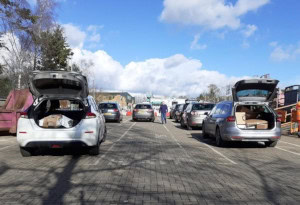A report revealed to letsrecycle.com this week shows that Glasgow is planning to build three autoclave facilities across the city, each capable of handling between 100,000 and 150,000 tonnes of mixed waste a year and potentially saving Scotland's largest city around £25 million a year in landfill tax by 2011/12.
Autoclave projects are also currently being undertaken by private companies in Gateshead and the Wirral (see letsrecycle.com), but, when last reported, were yet to secure council contracts.
The Glasgow report, entitled ‘Waste Management Option Appraisal' and prepared for the council's executive committee, did outline that gasification or incineration could be introduced at a later date as a secondary waste treatment process.
The publication of the document precedes the adoption of a formal waste strategy in Glasgow, which was originally due to be take place in June, and is hoped to help the city divert waste from landfill and boost its 18% recycling rates to targets set by reach the Scottish Government of 40% by 2010 and 70% by 2025 (see letsrecycle.com story).
The council also unveiled plans to form the Sustainable Glasgow Consortium – an agreement led by the University of Strathclyde which intends to turn Glasgow into one of Europe's most sustainable cities within the next decade.
Announcing the plans, council leader, councillor Steve Purcell, said: “The technologies we hope to bring to the city – and the new ground we hope to break with our partners Sustainable Glasgow consortium – are about creating a vibrant and successful future for Glasgow; not only as Scotland's greenest city, but as one of the most sustainable in Europe.
“That's a big aspiration, but it's also a huge opportunity and one we and our partners believe is right for Glasgow,” he added.
Aspiration
Glasgow's support for autoclave technology comes after the council's head of waste strategy last year claimed it could help the city – which has traditionally had a low recycling rate – to capture more recyclables from flats (see letsercycle.com story).
In the latest report, the council found that adopting a combustion technology in addition to autoclaving could conflict with Scottish Government plans to cap energy from waste at 25% and be too expensive.
Council figures suggested gasification could cost £133 million, while energy-from-waste would be around £185 million. Biological treatment processes were also not taken into consideration after they were deemed incapable of helping Glasgow to meet its ambitious recycling and composting targets.
However, the council did not rule out the introduction of gasification or incineration technology at a future date as a secondary process.
Procurement
Glasgow's report outlines three main routes of procurement: The council both building and running the facility itself; a joint venture with a project partner; or, the option of Glasgow entering an agreement with a private company to design, build and construct the autoclaves as merchant facilities.
Despite being undecided on the best route to pursue procurement, the report did state that it would prefer to lessen the risk it takes and still be able to make a profit, saying “markets for the fibre are developing and it would be the intention to transfer the risk for the marketing and sale of the fibre to the project partner”.
Destinations
Glasgow's three autoclaves are expected to be introduced in a staggered process to existing waste treatment sites in the city. Polmadie, which lies south of the city, currently has a licence to process 150,000 tonnes of waste per annum and has previously housed an incinerator. This would be the first site to adopt an autoclave facility and make use of its close proximity to rail links for movement of recyclables going to the autoclave and fibre coming out.
Autoclaving uses a pressurised rotating vessel which, through a combination of steam, pressure and agitation, results in the organic fraction of the waste being separated and broken down into a fibre. The fibre would count towards recycling targets, and could then be sold on to markets for use within product manufacturing or as a fuel source.
In the north of the city, Dawsholm, which currently has a civic amenities site and waste transfer station, would need its incinerator decommissioned, despite it not being used since 1986, before it could have the second autoclave facility introduced. And, the final site has been put forward at East Queenslie, also to the south, which benefits from access to the M8.
The report outlined that projections of when these three sites would hopefully be operational would be as follows: Polmadie, Autumn 2011; Dawsholm, December 2012; and, East Queenslie, Autumn 2013.
Funding
Glasgow now hopes to have an Outline Business Case in place by September this year and a contract in place with a project partner by autumn 2009.
Glasgow council said that part of the funding for the £134 million project, which the Outline Business Case will hope to refine and update, could be gained from Scotland's Zero Waste Fund, which superseded the Strategic Waste Fund.
The Fund, which is valued at £154 million over three years, could deliver some of the £50 million it has earmarked for community projects, with Glasgow contemplating a bid for funding once working group findings on the subject are known.










Subscribe for free